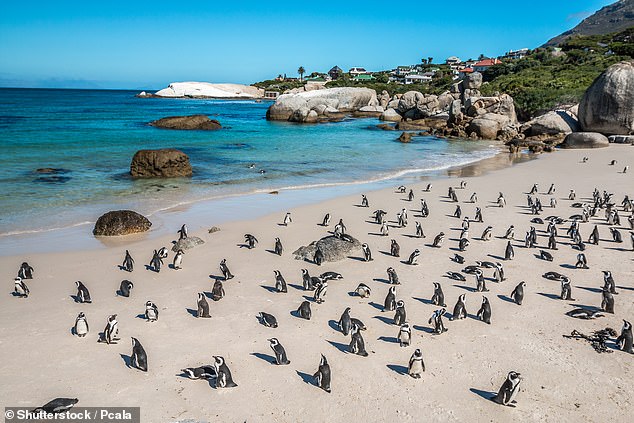Dreaming of spending a day on the beach? you are not alone.
It seems that humans are not the only creatures that enjoy the sun, sand and the ocean.
Globally, the Animal Kingdom has almost taken over the beach.
From eating seaweed to bright pink flamingos, American wild horses, and even pigs and penguins – there are plenty of coastal areas to watch the wildlife side.
Scroll down to see more…

The boulder beaches in Cape Town, South Africa may be named after the granite boulders dotted along the coastline, but are now known for their resident penguin population. Currently, there are about 3,000 African penguins in the colony and visitors can view them from specially designed boardwalks

The Northern Great Elephant Seal was often hunted for its greasy blisters, which led to a sharp decline in the United States. Thankfully, they gained protection status and returned to the coast of California. The Great Seal of San Simeon’s Great Seal Attraction (pictured above) is an ideal sunbathing spot with approximately 17,000 seals in the area during peak season

No flamingos were missed on the aptly named flamingos beach in Aruba. These flamingos are not native to the area, but they are residents of private beaches on the Aruba Renaissance island. Mixed with flamingos on the beach will cost you as you have to stay in a Renaissance hotel, or pay a one-day pass ($130/£101).

Kangaroos are common in Australia, but do you want them to spend a day at the beach? Western Australia’s Lucky Bay (pictured) won the award for its perfect white and clear water, and it seems that Kangaroos love it too. Flexible residents of white sand beaches are most common at night

There are wild horses on the Assateague Island on the east coast of the United States, which they often find on the beach. It is believed that horse stee feet went to the island’s shore to escape mosquitoes and flies. National Park Services describes horses as “beautiful, difficult and wild”, and Assateague is one of the only places in the U.S. where Mustangs can be seen

Monkey Beach on Phi Phi Island, Thailand is famous for its residents – you guessed it – with its monkey population. Long-tailed macaques live in the surrounding jungle and relax regularly on the beach. They may look friendly, but they are not advised to approach them as they can be aggressive in finding food

North Ronaldsay in Orkney Archipelago, Scotland is home to the rarest sheep in the world. Northern Ronald sheep have bred in the Orkney Islands for centuries. But the matrilines won’t believe in their diet. In the 19th century, poverty on North Ronaldsay meant that only the island’s cows were allowed to grazed on the grass. Sheep adapted to feed on seaweed kelp – still do it today

The large reef in the Bahamas is an uninhabited person-that is. The pig’s colony roams the sand and swims in the sea. These beach hotties are believed to have been brought to the island for agricultural purposes, but are still residents. Hurry up the boat to the island, and the pigs can swim and say hello
